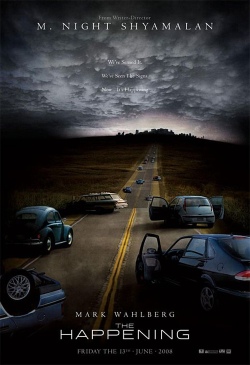Stan Winston has died. A sad day in movie history.
At least he went in peace, having accomplished much. This is a lot more than most people get.
If there’s an afterlife, they’re about to get really cool special effects.
Stan Winston has died. A sad day in movie history.
At least he went in peace, having accomplished much. This is a lot more than most people get.
If there’s an afterlife, they’re about to get really cool special effects.
 (This, in case you were wondering, is a review of the film The Happening, by M. Night Shyamalan, and some thoughts about his work in general.)
(This, in case you were wondering, is a review of the film The Happening, by M. Night Shyamalan, and some thoughts about his work in general.)
First, Shyamalan gifted us with The Sixth Sense, a movie about dealing with pain and loss, overcoming fear and working towards compassion, and using your gifts to help and heal others. It was successful because people wanted to see the scene with the kid whose head is half missing. “Whoa, creepy!” and all that. And it was remembered because of the twist at the end, which is nice but not the point of the movie.
Then there was Unbreakable, a film that sounds and feels and looks absolutely unique, featuring the best and most layered performance Bruce Willis has ever given, also a fantastic performance by Samuel L. Jackson, an incredible score by James Newton Howard, and a very original plot about finding yourself that succeeds at being dark and inspiring at the same time. Unfortunately it also has a really good twist at the end, which also isn’t the point of the movie, but was apparently the only thing people were capable of latching on to.
Third came Signs, which gave Mel Gibson and Joaquin Phoenix deep and simultaneously hilarious parts, and which was scary in a subtle, intelligent way, and which had a twist ending which was well-conveived but ill-executed. But at this point, barely anyone was actually watching the movie anymore, they were just waiting for the twist, and they all missed the wonderful scenes between Gibson and Phoenix and the children – some touching, some hilarious.
Then there came The Village, a profoundly touching love story that was marketed as a horror movie, and which people went to see hoping to see some gore (or at least something scary)… and the twist, which once again isn’t the point of the movie (except in that it propels the love story in a different direction, and makes the ending a lot more positive and hopeful and progressive than it would otherwise have been). And of course people complained, and the critics hated it, and missed the beautiful cinematography, yet another great score by James Newton Howard (Signs was OK; more on that later) featuring the amazing violinist Hilary Hahn, amazing performances by every single actor, and a script that is more intelligent and complex than the publicity ever let anyone think. Those who wanted a horror movie hated it. Those who wanted a period piece hated it. Those who just wanted to hate it hated it. Very few people got what it was actually about, even though it’s entirely obvious. Publicity can all too easily work against a movie.
And finally, there was Lady in the Water, a bedtime story that is half comedy and half drama, full of underplayed sadness, eccentric but likeable characters, and a hilariously mad self-referential critic character played by the wonderful and underrated Bob Balaban. The critics, who generally hate anyone who makes movies that are subtle and emotional instead of contrivedly sentimental or exhibiting apathy disguised as world-weary cynicism, hated its guts. And I don’t think they took to being made fun of very well, either. Nobody got Lady in the Water – nobody got that large parts of it are funny and silly and meant to be so. That this is what a supernatural event might be like if it happened to everyday, flawed people. In a way, it’s a very realistic movie. But the very idea that art may be meaningful, that normal people can change the world… not very popular. Especially when there’s a well-done anti-war undertone to the whole thing. Can’t have that, no. And to top it all off, Shyamalan gave himself the part of a flawed but very important character. That’s just egocentric. When an actor casts himself in the lead part of a movie he’s directing (see Braveheart), that’s just super – but when a director, who has also done some acting for most of his career, gives himself a small but important part… that’s a crime.
M. Night Shyamalan has the problem that anyone who is both good and successful, while simultaneously maintaining integrity and vision, has: it has become fashionable to hate him and his movies. It has nothing to do with the actual movies he makes. Which is one of the reasons The Happening is likely to fail – had it been directed by John “Boogie” Generic the Third, Lord of Troutville, it would’ve been a real success, hailed as a “shocker” that “strikes deep into the heart of modern fears” while simultaneously having “strong, unique performances by actors cast against type” in a movie that has “more levels than just that of horror.” Or something like that.
But that is unlikely. Chances are it will fail at the box office for two reasons: it’s a Shyamalan movie, and it’s really old-fashioned. What does this mean?
So what is likely to happen? People will complain about the film being preachy. The performances will be trashed, especially Mark Wahlberg’s – because he was a rapper, or because it’s a Shyamalan movie, or because some women find him attractive, or because some people just don’t want to admit that he can act. Kind of the Ben Affleck effect. (Affleck is actually an even better actor, and a really good writer. Shame the media were looking for a toy to play with. He did make some crappy movies, but who hasn’t? He also turned in some great performances and was ignored for the longest time.) Some people will even complain about twists, when there really aren’t any. There are some plot developments, sure, but if you count those as twists, you’re an idiot. Same goes for the ending.
Others will find the film too slow, too boring, or will compare it unfavourably to Cloverfield and similar content-free shakycam trash. And maybe thirty years from now, people will see that this is a pretty good film. After all, they trashed Blade Runner. And Citizen Kane. And The Matrix Reloaded/Revolutions. And Star Wars. And Southland Tales. And a lot more of my favourite movies. But the real question, to my mind, is what will happen to the career of M. Night Shyamalan, one of the most talented and visionary writer/directors I know, someone with both the technical talent and the originality that mark a true artist. If The Happening flops, as it probably will (I saw the preview in a cinema the size of a cupboard; they were playing Sex and the City on the big screen), this will make financing even harder to find for his next project. And I’d really like to see what else he’ll come up with.
Third edit: More up-to-date thoughts in A Summary of Shyamalan.
Yay! After months of problems, finally a new teaser. I think it gives a pretty good impression, in an abstract sort of way, of what the movie is like, especially when combined with the old teaser.
Watch it or download it here – TEASER TRAILER FOR THE GREAT MACHINE: A NIGHTMARE.
If Firefox refuses to play it, download it and watch it from your harddrive. Windows media files are strange sometimes.
Reasons I haven’t been posting much:
Now I shall have a look at Oblivion, and then continue working.
 In a most wonderful turn of events, the extraordinary Helen Trevillion is, despite some massive communication fuckups (mostly my fault), writing the music for The Strange and Somewhat Sinister Tale of the House at Desert Bridge. This is fantastic news, as I really can’t imagine anyone else being up to the task.
In a most wonderful turn of events, the extraordinary Helen Trevillion is, despite some massive communication fuckups (mostly my fault), writing the music for The Strange and Somewhat Sinister Tale of the House at Desert Bridge. This is fantastic news, as I really can’t imagine anyone else being up to the task.
The game isn’t done yet – as I’ve mentioned before, when the deadline went out the window I decided to add thousands of insane little details – but the demo I compiled for Helen has almost the entire gameworld and most of the game logic in it (and it’s just 17MB). Which means nothing to you, but to me is a sign that we’re getting closer to a release, and also reminds me just how full of weird stuff it is.
 Saw the preview yesterday.
Saw the preview yesterday.
Loved it.
The story is good, the actors are fantastic – above all Harrison Ford, but I was also very fond of Karen Allen – and it just feels right. This is Indiana Jones. The movie may not have a strong enough climax (it’s exciting, but it never builds to the levels of Temple of Doom or Last Crusade), it may be a little too short, Cate Blanchett’s accent may sometimes pop out a little (though she’s wonderful otherwise), all kinds of shortcomings may be found… but in the end, it’s an amazing, fun ride, and 100% Indiana Jones.
Which is what the fans, such as myself, were hoping for. What people who enjoy cinema were hoping for. As for the naysayers, they would have complained no matter what the film was like; for them, it’s more about portraying themselves in a certain light than about the movie. The same mindless snobbery that affected the Star Wars prequels is likely to happen here, too: people who haven’t even payed attention to the movie, who haven’t spent half a second of thought on it, but want to prove how “grown up” they are by dismissing things that are new. “In my time, movies didn’t have special effects, they had models, which are real, yes, they’re actually the size of the actual actors…” That kind of thing. And then there are movie critics, who generally hate anything that is fun and intelligent, and especially hate it when something is successful more than once. Ahh! Evil!
Go see Indiana Jones and the Kingdom of the Crystal Skull. You’ll have fun. You’ll have moments to remember. What more can one ask of a good adventure movie?
 The Fall – Last Days of Gaia is a post-apocalyptic RPG by German developer Silver Style Entertainment. The original version was plagued by bugs to the point of being unplayable, but there’s a “Reloaded” version out which you can get at “budget” prices (what a weird term).
The Fall – Last Days of Gaia is a post-apocalyptic RPG by German developer Silver Style Entertainment. The original version was plagued by bugs to the point of being unplayable, but there’s a “Reloaded” version out which you can get at “budget” prices (what a weird term).
Anyway, since I’m a fan of such games – Fallout 1 & 2 above all – and because I really miss playing good RPGs, I decided to give this one a shot. As with most RPGs I’ve recently played (Gothic 3, Two Worlds, a bunch of others) it is ultimately disappointingly stupid.
Now, I should be fair. I haven’t played the game much. Certainly not enough to be able to offer a completely objective opinion. The reason I haven’t played it much, however, is not because I didn’t want to. It’s because the flaws this game has are so annoying as to prevent me from playing for more than 20 minutes without banging my head against the keyboard and causing all the cornflakes lost therein to pop out. OK, that was both disgusting and untrue. There are no cornflakes in my keyboard. I have no idea what those things are.
Anyway. This is not going to be a full review, because I have neither the time, nor the in-depth knowledge of the game to write one. So it’s going to be a list.
I’ll keep on playing the game, and trying to have some fun. If I manage to do so without going crazy, I will report back.
Marc-Uwe Kling returns with a new version of his brilliant song, with even better lyrics – which he proceeds to sing to an audience which is, as my friend Julian put it, visibly not amused. Ah, the joys of telling middle-class pseudo-progressive Germany the truth about the consequences of its actions.
Yes, the song and video are in German, so if you don’t speak that particular language, you won’t be able to enjoy this masterpiece. Don’t be sad, though; except for this and the original-language version of Gothic I and II, you’re not missing much. Goethe is overrated, Schiller couldn’t write to save his life, and most of the rest is better when translated anyway.
Is it any wonder I want to get out of this country? Rootkits on my computer, idiots in the government, hypocrites in the audience… and the weather still sucks.
At least they make good RPGs.
P.S. When I say that Gothic II is better art than the complete works of Goethe, I mean it. I hope some German art critic reads this and dies.
You know, despite it being influenced way too much by JRPGs, and despite having some truly idiotic features (such as the system for saving, the lack of choices or detail in the main storyline, and the NPCs), I was enjoying Fable: The Lost Chapters , which Verena gave me as a present. It was quite a bit of fun, especially for someone as starved for a decent RPG as myself. (Most of the recent ones I’ve played were pretty, but boring.)
Until, that is, I started the game up this morning and saw that my profile and all its savegames were gone. Poof. Just like that. And no Mr. Game Designer, I’m not replaying the huge and mind-numbingly boring intro, nor am I redoing all those unbelievably annoying and tedious NPC quests again.
In other words, I’m out of gaming material. Again.
*sigh*
 Few things make me as deliriously happy as the song “Scurvy!” by Captain Bogg & Salty. There’s just nothing as cool as pirates, is there?
Few things make me as deliriously happy as the song “Scurvy!” by Captain Bogg & Salty. There’s just nothing as cool as pirates, is there?
No, ninjas aren’t as cool. Not even half as cool. They’re only cool when they’re also monkeys. And even in that rare case, pirates are still much, much cooler.
And I suppose I have to put something else here, because otherwise the image screws up the formatting.
So, don’t forget: if there is scurvy on your pirate ship, eat a lime!
YARRRRRRRRRRRRRRRRRRRRRRRRR!
Peter David has an intelligent and eloquent post about the Christian family that let their young daughter die of diabetes because they thought God would save her. It is profoundly depressing to see how deluded people can be (and I’m not referring to their religiosity per se; read David’s post). It is also a strong reminder of how little many Christians know about their own Bible.
The title is a reference to a Babylon 5 episode about the same topic (not written by Peter David). I was immediately reminded of it, and of the fact that some people think the story is unrealistic. How unfortunate that it isn’t. But the thing is this: in the B5 episode, the parents are deeply affected by their child’s state. Death by diabetes is slow and horrible, yet Kara Neumann’s parents didn’t seem to be moved by that, arrogantly trusting that they were the Chosen Ones to whom God would exclusively reveal himself. There is only one word for this kind of behaviour: madness.